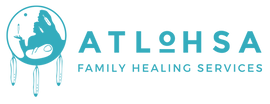Yakhiya’take’nhas Yukwahwatsilay^tu
The Program
Yakhiya’take’nhas Yukwahwatsilay^tu is a transitional housing program for Indigenous women and their dependent children who are experiencing violence or homelessness or are at risk. It provides support as these women and children transition to safe and secure housing. Yakhiya’take’nhas Yukwahwatsilay^tu in Oneida means, “They and I are helping families.”
Safe and Supportive Living
Yakhiya’take’nhas Yukwahwatsilay^tu is an 11-unit apartment building that provides shelter for up to one year in a safe, supportive, communal living environment. Utilities are included but tenants pay rent. The site offers onsite laundry facilities, a meeting area, shared kitchen, play area and TV common area for children. Our goal is to transition residences into permanent, safe and affordable housing.
Our Services
Atlohsa staff members are on site Monday-Friday to provide structure, counseling, referrals and Indigenous-led support.
While Atlohsa does not provide long-term housing, we can help with providing information and necessary applications for Native housing. This includes but is not limited to agencies such as Ontario Aboriginal Housing services and locations like the Four Feathers Housing Cooperative and the Native Inter-Tribal Housing Cooperative.
For more information, please contact yakhiyatakenhas@atlohsa.com.
If you are in need of emergency shelter, contact Zhaawanong Shelter: 1-800-605-7477


A Hand Up, Not A Handout
Supportive housing helps those in need or at risk move from crisis to stability. It can be the turning point to achieving self-sufficiency and independence. It provides a sense of belonging and helps families stay together while they get on their feet again. Allowing them to focus on improving their situation instead of focusing on where they will sleep tonight. So, they can put their efforts into things like employment or educational opportunities. The community also benefits as these individuals and families then become active and productive members of the community as well.


